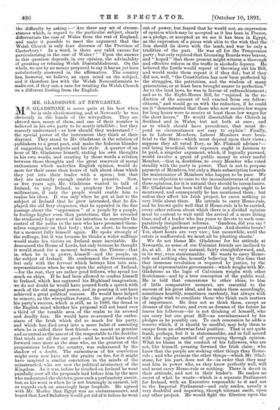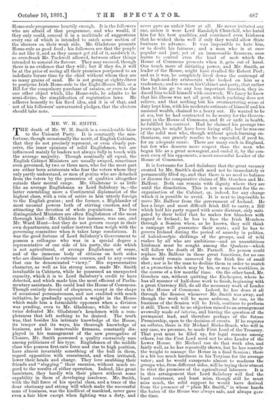GLA_DSTONE AT NEWCASTLE.
MR. GLADSTONE is never quite at his best when he is only electioneering, and at Newcastle he was obviously in the hands of the wirepullers. They are • shrewd men, many of them, and one of their number is 'believed in his own party to be nearly infallible ; but they scarcely understand—as how should they understand ?— the special power of the instrument they think at their disposal. They stand to Mr. Gladstone in the relation of ',publishers to a great poet, and make the hideous blunder of suggesting his subjects and his style. A quarter of an hour of Mr. Gladstone himself, stating his own thoughts in his own words, and creating by those words a relation between those thoughts and the great reservoir of moral enthusiasm which underlies English opinion, would do more for their cause than hours of talk about ideas which they put into their leader with a spoon ; but that they are naturally enough unable to perceive. Now, as five years ago, Mr. Gladstone wanted to talk of Ireland, to pity Ireland, to prophesy for Ireland a millennium, if only the people would enable him to realise his ideas. It was only When he got at last to the subject of Ireland that he grew interested, that he dis- played the old fiery eloquence, that he appealed in the fine passage about the " oppression " of a people by a people, to feelings higher even than patriotism, that he revealed the studiously kept secret of his intention to surrender the control of the police to the men who have promised them- selves vengeance on that body ; that, in short, he became for a, moment fully himself again. He spoke strongly of the suffrage, but it was because he thinks a wider suffrage would make his victory on Ireland more inevitable. He denounced the House of Lords, but only because he thought it would stand for a moment between the Throne—that is, when he is in power, himself—and the people, on the subject of Ireland. He condemned the Government, but only with the fervour which betrays him into mis- representations when he was upon the subject of Ireland, —for the rest, they are rather good fellows, who spend too much on ships. If he had been allowed to confine himself to Ireland, which has captured his Highland imagination, we do not doubt he would have poured forth a speech with much of the old magical power, and in pouring it out have athieved a great political success. He would have helped to remove, as the wirepullers forgot, the great obstacle to his party's success, which is still, as in 1886, the dread in the English mind whether his proposal will not hand over a third of the taxable area of the realm to its avowed and deadly foes. He would have re-aroused the enthu- siasm of the Irish which did so much for his party, and which has died away into a mere habit of assenting when he is called their best friend—an assent as genuine and as unreal as the assent of the respectable to the doctrine that trials are all for our good—and he would have stood forward once more as the man who, on the greatest of the propositions before the country, was unharassed by the shadow of a doubt. The earnestness of his conviction might even now have set the prairie on fire, for it might have inspired a similar conviction in the minds of the uninstructed, who are now the political aristocracy of the Kingdom. As it was, before he touched on Ireland he went painfully over all the proposals laid before him by the men who understand the electors, gave each a perfunctory assent, but, as his wont is when he is not burningly in earnest, left as regards each an amazingly large loophole. He agreed with Mr. Morley that Egypt was an embarrassment, and hoped that Lord Salisbury would get rid of it before he went out of power, but feared that he would not, an expression of opinion which may be accepted as it has been in France, as a pledge, or accepted as we see it has been in Egypt, as the expression of a pious wish akin to the wish that the lion should lie down with the lamb, and war be only a tradition of the past. He was all for the Temperance party ; but only rejoiced that Licensing Boards were braver, and "hoped" that those present might witness a thorough and effective reform in the traffic in alcoholic liquors. He believed the Lords would repent of throwing out his Bill, and would make them repent it if they did ; but if they did not, well, "the Constitution has now been perfected by the struggles, the patriotism, and the wisdom of many generations, or at least been brought nearer to perfection." As to the land laws, he was in favour of enfranchisement ; and as to the Eight-Hours Bill, he "rejoiced in the re- duction of the amount of toil exacted from our fellow- citizens," .and would go on with the reduction, if he could see it "demonstrated that those who now receive low wages for long hours were to receive at least those low wages for the short hours." He would disestablish the Church in Scotland and in Wales, but not both at once ; and as to which should have precedence, that must de- pend on circumstances not easy to explain ! Finally, as to Labour Members, Labour Members were bene- ficial to the State—which must depend upon their views ; suppose they all voted Tory, as Mr. Plimsoll advises 9— and being beneficial, their expenses ought in fairness to be paid, a singular argument, which, if logically pursued, would involve a grant of public money to every useful Member,—that is, doubtless, to every Member who voted steadily with the party in power. That is not to propose payment of Members, but only a State subscription towards the maintenance of Members who happen to be poor. We have no objection to raise to the inconclusiveness of most of these opinions, for it is natural they should be inconclusive. Mr. Gladstone has been told that the subjects ought to be mentioned, and consequently he has mentioned them ; but unless they affect his Irish project, he cares nothing or very little about them. He intends to carry Home-rule, and he knows quite well that if Home-rule is to be carried, every other reform about which there is a divided opinion must be content to wait until the arrival of a more fitting time, and of a leader who has years to devote to such com- paratively insignificant reforms. Gardens, did you say ? Oh, certainly ! gardens are good things. And shorter hours ? Yes, short hours are very nice ; but meanwhile, until the estate is reafforested, we must all be planting shoots.'
We do not blame Mr. Gladstone for his attitude at Newcastle, as some of our Unionist friends are inclined to do, at all. It is very natural, fairly straightforward, and, in its way, even statesmanlike. He wants to carry Home- rule and nothing else, honestly believing by this time that that immense revolution is required by justice, by the logic of representative government—which weighs with .Mr. Gladstone as the logic of Calvinism weighs with other Scotchmen—and by a true conception of the public weal. He is told that concessions to other ideas, to him of little comparative moment, are essential to the success of his great ideal, and he makes them accordingly, sometimes heartily, sometimes carelessly, but always with the single wish to conciliate those who think such matters of importance. He does not so think them, except as dreams of the future, and, even as dreams of the future he leaves his followers—he is not thinking of himself, who can carry but one great Bill—as unembarrassed by his pledges as he possibly can. To each concession he adds a reserve which, if it should be needful, may help them to escape from an otherwise fatal position. That is not quite frank, perhaps, but it is statesmanlike, and in full accord with the regular method of governing through opinion. What we blame is the conduct of his followers, who are not, like himself, pressing forward the Irish claim ; who know that the people are seeking other things than Home- rule ; and who promise the other things—which Mr. Glad- stone, for his part, does not do—in order that they may seat him in power who, as they know perfectly well, will and must carry Home-rule or nothing. There is deceit in their attitude, and not in their leader's. He makes no secret of what he wants—which is a separate Parliament for Ireland, with an Executive responsible to it and not to the Imperial Parliament—and only smiles, usually a very doubtful and inquiring, though tolerant smile, upon any other project. He would fight the Election upon the Home-rule programme heartily enough. It is the followers who are afraid of that programme, and who would, if they only could, conceal it in a multitude of suggestions every one of which is intended to catch some section of the electors on their weak side. Mr. Gladstone presents Home-rule as good food ; his followers see that the people do not like it, and as they cannot get rid of it, sandwich it, as over-frank Mr. Tuckwell allowed, between other things intended to conceal its flavour. They may succeed, though there is no evidence that they will; but if they do, it will be at the price of seeing all their promises postponed to an indefinite future time by the chief without whom they are so many grains of sand. He is not going at eighty-three to postpone Irish Home-rule to the Eight-Hours Bill, or a Bill for the compulsory purchase of estates, or even to the one other object which, like Home-rule, he admits to be semi-divine, the simplification of registration laws. He adheres honestly to his fixed idea, and it is of that, and not of his followers' unwarranted pledges, that the electors should take note.























































 Previous page
Previous page